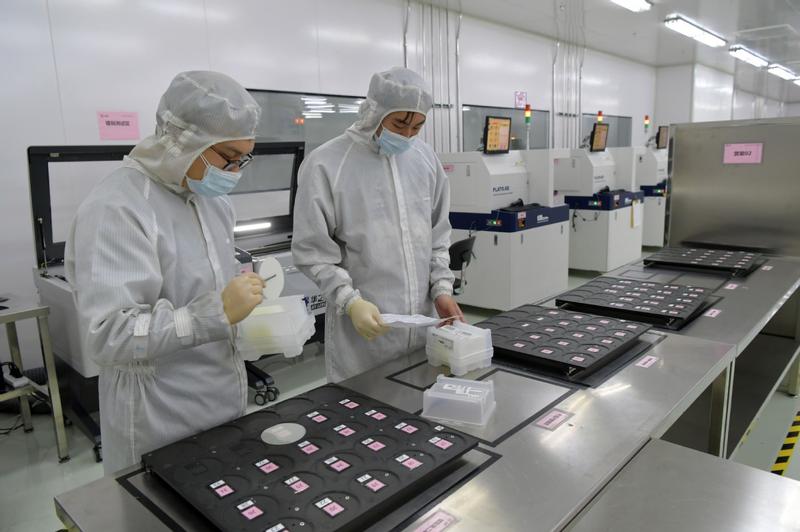 Employees perform tests on semiconductor chips at the production facility of a Nanchang, Jiangxi province-based high-tech company on Feb 13. (PHOTO / XINHUA)
Employees perform tests on semiconductor chips at the production facility of a Nanchang, Jiangxi province-based high-tech company on Feb 13. (PHOTO / XINHUA)
The novel coronavirus outbreak will have a limited impact on China's semiconductor industry since most local wafer manufacturing plants are operating normally and chip design companies can choose remote work to mitigate the fallout from the epidemic, the companies concerned and analysts said.
Most chip design companies have also resumed operations, with most employees working remotely from their homes
The chip packaging and test business may be affected to some extent due to the labor shortage, they added.
Semiconductor Manufacturing International Co, the top contract chip manufacturer in the Chinese mainland, said on Friday the company will double its capital spending and expects revenue to grow more than 10 percent this year despite the epidemic.
Zhao Haijun, co-CEO of SMIC, said at an earnings call that all of the company's factories which are mainly located in Shanghai, Beijing and Tianjin are running at full capacity.
ALSO READ: Nation in big semiconductor push
The comments came after the company had organized a work group before the Spring Festival holiday to ensure that plants could stay open, while protecting the safety of employees and following government regulations.
"SMIC needs to ensure that factory production runs 365 days a year, 24 hours a day to meet customers' fabrication needs," the company said in a statement.
Fang Jing, chief electronics analyst at Cinda Securities, said most wafer manufacturing plants are dust-free, which makes them less vulnerable to virus infection. It is also a common practice in the industry to keep the highly-automated plants running all year round.
Located in the badly hit city of the contagion outbreak, the Wuhan, Hubei province-based Yangtze Memory Technologies Co Ltd also said its production and operations are proceeding normally and in an orderly manner.
The company has enacted certain isolation measures and partitions to ensure the safety of employees. It is also striving to coordinate with multiple sides to maintain the supply of industrial production materials and logistics services to ensure the sustainability of its businesses, YMTC said in a statement.
Most chip design companies have also resumed operations, with most employees working remotely from their homes.
Shanghai-based HiSilicon, the chip arm of Huawei Technologies Co, said it has already restarted operation. It added that it is pouring resources into maintaining normal operations while preventing its employees from getting infected by the virus.
Unisoc Technologies Co, a core chip subsidiary of Tsinghua Unigroup, said its employees have also gone back to work, with its plants running non-stop since the Lunar New Year holiday.
Though logistics services have been affected by the novel coronavirus outbreak, the company said that it is working hard to solve the problem.
Allwinner Technology, a chip design company based in Zhuhai, Guangdong province, also said it has resumed operations, and shipped a batch of new products last week.
Analysts said the epidemic is partly harming the chip packaging business.
Fang of Cinda Securities said unlike wafer manufacturing plants which run non-stop year round, chip packaging factories usually are closed during the Spring Festival for maintenance work on their equipment.
Taiwan-based chip packing and test company AES said recently the lack of available labor is the biggest problem for its mainland branches. Traffic restrictions during the outbreak make it difficult for many employees who have gone home for the holidays to return to work.
Even if they manage to return, they have to go through the process of health examinations and a seven to 14-day quarantine period.
Another factor is that the first quarter is usually the off-season for the semiconductor industry, which provides a cushion of time for its companies.
AES said despite all the difficulties, 60 to 70 percent of its employees in its plants in the Chinese mainland were on duty during the Spring Festival holiday.
By the end of February, the proportion is expected to reach 80 percent to 85 percent, and by the end of the first quarter, all of its employees will have returned to work, the company said.
JCET Group, another Chinese chip packaging and test company, said earlier this month that its production and operations remain stable. Due to abundant orders during the Spring Festival, only few employees of the company's plant in Jiangyin, Jiangsu province, had gone home for the holidays.
The company said it currently has enough stocks of industrial production material to meet demand. It added it is working closely with government agencies and supply partners to see how to get more raw materials to meet future demand.
READ MORE: Foxconn 'eyes semiconductor field'
Western Securities said in a report that the outbreak will not alter the long-term, strong momentum of China's semiconductor sector.
The upcoming large-scale rollout of 5G networks and the push of China's tech giants to cultivate local chip suppliers have combined to inject fresh vitality into the industry.
China will still build its 5G networks this year. The demand may be delayed by the virus, but it will not vanish, Fang of Cinda Securities explained.


